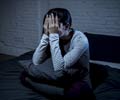About
"I have secluded myself from society; and yet I never meant any such thing. I have made a captive of myself and put me into a dungeon, and now I cannot find the key to let myself out". -Nathaniel Hawthorne
Depression may be defined as the state of extreme melancholy, where patients who exhibit this condition may develop severe apathy towards their environment. Their physical activity may lessen considerably and can even spend hours in any single posture. Till date, treatment was only done by routine prescription of antidepressants and psychotherapy. More severe cases were given electro-convulsive therapy.

Depression in adolescents is in many ways quite similar to that of adults. The DSM-IV manual also cites the criteria for depression in adults and adolescents to be same. Younger teenagers may not be able to express their feelings as the older ones and hence the symptoms of depression may be expressed as phobias, bodily complaints, behavior problems, or as separation anxieties. Teens suffering from psychotic depressions may report hallucinations.
Some common symptoms of teen depression may be the following:
- Decline in academic achievements.
- Behavioral problems in friendship.
- Withdrawing from contact with family and other people.
- Lack of enthusiasm and energy. Difficulty in self-motivation.
- Unnecessary aggression, anger and rage.
- Report of feelings of sadness and helplessness.
- Over-reaction to criticism.
- Feels incapable of living up to the parental expectations.
- Lacks self-esteem and suffers from guilt.
- Unable to concentrate or take decisions.
- Feeling restless and agitated.
- Changes in eating and sleeping habits.
- Having suicidal thoughts or suicidal attempts.










